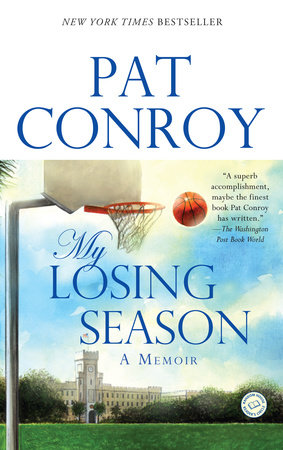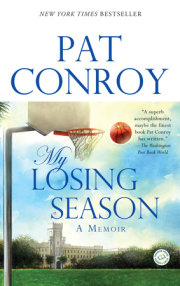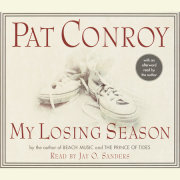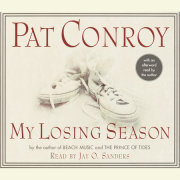chapter 1
Before First Practice
It was on the morning of October 15, 1966, that the final sea-son officially began. For a month and a half, my teammates and I had gathered in the field house to lift weights, do isometric exercises, and scrimmage with each other. Right off, I could tell our sophomores were special and were going to make our team faster, scrappier, and better than the year before. In the heat of September, there was a swiftness and feistiness to the flow of these pickup games that was missing in last year's club. My optimism about the coming season lifted perceptibly as I observed my team beat up on each other in the vagrancy of our uncoached and unmonitored scrimmages.
I could feel the adrenaline rush of excitement begin as I donned my cadet uniform in the dark, and it stayed with me as I marched to mess with R Company. I could barely concentrate on the professors' voices in my classes in Coward Hall as I faced the reality of the new season and stared at the clock with impatience. It was my fourth year at The Citadel and the fourth time October 15 had marked the beginning of basketball practice. Mel Thompson was famous for working his team hard on the first day and traditionally ran us so much that the first practice was topped off by one of us vomiting on the hardwood floor.
I made my way to the locker room early that afternoon because I wanted some time to myself to shoot around and think about what I wanted to accomplish this season. Four of my teammates were already dressed when I entered the dressing room door. The room carried the acrid fragrance of the past three seasons for me, an elixir of pure maleness with the stale smell of sweat predominant yet blended with the sharp, stinging unguents we spread on sore knees and shoulders, Right Guard deodorant spray, vats of foot powder to ward off athlete's foot, and deodorant cakes in the urinals. It was the powerful eau de cologne of the locker room. I realized that my life as a college athlete was coming to its inevitable end, but I did not know that you had to leave the fabulous odors of youth behind when you hurried out into open fields to begin life as an adult.
As I entered the room, I waved to Al Beiner, the equipment manager. He and his assistant Joe "Rat" Eubanks were making sure that the basketballs were all inflated properly. Carl Peterson, another assistant, had just returned with a cartful of freshly laundered towels, still warm to the touch.
"The Big Day," Al said. He was reserved and serious and considered the players juvenile and frivolous. Al's presence was priestlike, efficient.
"Senior year," Rat said. "It all comes together for the big guy this year, right, Pat?"
Joe Eubanks was the only man on campus who called me "the big guy." Five feet five inches tall, he was built with the frail bones of a tree sparrow. His size humiliated him but his solicitousness to the players made him beloved in the locker room. Joe hero-worshiped the players, a rarity at The Citadel. His wide-eyed appreciation of me reminded me of the looks my younger brothers gave me. My brothers thought I was the best basketball player in the world, and I did nothing to discourage this flagrant misconception.
When I began undressing, Carl brought over a clean practice uniform and a white box containing a pair of size 91Ú2 Converse All Star basketball shoes. Carl wore gold stars for his brilliant academic work and moved quietly among the players, silent as a periwinkle.
As I sat down to open the new box of shoes, Joe Eubanks slipped up behind me and began massaging my neck.
"Still hurt, Pat?" Joe asked. "It's been two years now." My neck had been sore since Dick Martini knocked me unconscious in a practice game.
Behind me Carl rumbled by with another load for the laundry room. Stepping out of the equipment office, Al warned us not to take our shoes out unless we signed for them. Joe brought a box of tape to Coach Billy Bostick, the mustachioed seventy-year-old trainer who taped Doug Bridges's ankles as Danny Mohr waited his turn.
Jim Halpin sat to my right, struggling to put on the grotesque knee brace which supported his ruined leg.
"Still happy about your choice of colleges, Jim?" I asked.
"This fucking place sucks," Jimmy answered as I knew he would. For four years, all conversation between Jim and me began with this withering mantra.
"Tell me what you really think, Jimmy, don't hold back," I said.
"Conroy, Halpin says the same damn thing every day, year after year," Danny said, sitting at the last locker, both his ankles taped.
"Thanks for pointing that out, Root," Bob Cauthen said.
"Fuck you, Zipper," Danny said, not even looking at Bob. Danny we called "Root" because he was not much of a leaper for a big man and stayed "rooted" on the ground beneath the basket. Bob was called "Zipper" by Danny because he was long and skinny. He was given that name by a heckler from Georgia Southern, and it stuck.
"Don't you love the fellowship on this team?" I said. "Can't you feel the brotherhood? The coming together of a group of guys who can never be broken or defeated?"
"Conroy," said John DeBrosse, unbuttoning his uniform shirt as he approached his locker. "Speak so us poor peasants can understand you. I got to carry a dictionary around to understand what your sorry ass is saying."
"Thank you, Lord, for directing my path toward The Citadel," I said. "I love this place, Lord. I truly love this place. I've found myself a home."
"This fucking place sucks," Jimmy muttered to himself.
"You're onto something, Halpin," Dave "Barney" Bornhorst, a wide-bodied forward from Ohio, said. "Keep working on the details."
Danny said, "I had scholarships to Davidson, NC State, Wake Forest. Do I go to any of those great places? Oh, no. I come to El Cid so I can spend my life with Muleface."
I looked to the door, watching for the sudden appearance of our coach. "Be careful, Danny."
Joe Eubanks came through the locker room. "Twenty minutes to get dressed and on the floor."
"Eat me, Rat," Bob said.
"Don't irritate me, Cauthen," Joe said, putting his tiny fist against Bob's chin.
"Make me laugh, Rat," Bob said.
"Leave Rat alone, Zipper," Danny called down from his locker.
Bob stuck up a middle finger at Danny and said, "Eat a big hairy one, Root."
"What a team," Jimmy Halpin said, shaking his head sadly. "This fucking place sucks."
The new assistant coach, Ed Thompson, came into the locker room and walked down the straight line of lockers, squeezing our shoulders or slapping our butts, whispering words of encouragement. A sweet-faced, soft-spoken man, he looked like an aging Boy Scout as he imparted his own enthusiasm about the beginning of the new season.
"Let's get ready to go, boys. Let's win it all this year. This is the year for us. Can you feel it, boys? Tell me now. Let's get on out there."
After he spoke to each of us, he retreated from the locker room like an ambassador for a third-world nation intimidated by the hauteur of the Court of St. James's. "Little Mel," as we called him, was intimidated by us still and did not feel comfortable interacting with us quite yet.
"Why'd Little Mel take this job?" Danny asked the room.
"He just lucked out," Bridges said.
"What a sinking ship," Bob said.
"Hey, none of that, Cauthen," DeBrosse said. "We're going to have a great team this year. None of this negative shit. Leave that in the barracks."
"Who are you, the fucking Gipper?" Bob answered.
Danny Mohr finished lacing his shoes and said, "I like Little Mel. What in the hell did he see in Muleface?"
"He just wanted to coach All-Americans like you, Mohr," Cauthen said.
"Eat me, Zipper," Danny said, again shooting Bob the finger.
"Can't you feel the team jelling?" I said. "Feel the camaraderie. Feel the never-say-die spirit. Nothing'll ever get between this band of brothers."
DeBrosse said, "Get the dictionary. Conroy's moving his lips again."
Rat appeared suddenly at the door and said, "Muleface left his office. Hurry up. He's on his way."
There was a headlong scramble of all of us as we raced for the door that opened to the floor. The sophomores had not spoken a word. It was their first day on the varsity team and they were nervous and mistrustful.
"This fucking place sucks," Halpin said, then moved out toward the sounds of boys shooting around, limping in his knee brace.
Copyright © 2002 by Pat Conroy. All rights reserved. No part of this excerpt may be reproduced or reprinted without permission in writing from the publisher.










